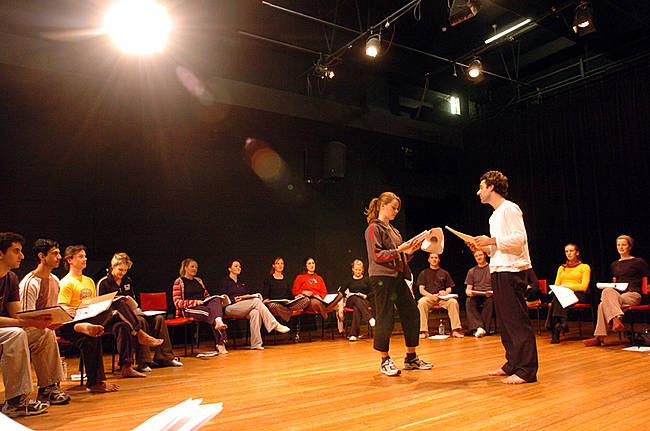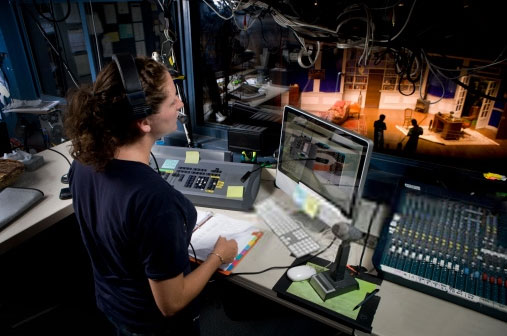When I saw “High School Musical 2” for the first time, I was disappointed because one of my favorite characters, enthusiastic drama teacher Ms. Darbus, was largely absent from the sequel. By the time the third movie came around, the quirky teacher had returned to provide her usual comic relief, with a side of wisdom.
While the films don’t see Ms. Darbus doing a lot of traditional teaching, she delivers her lessons in the form of helpful tips and encouraging her students to explore the arts and find their passion. She assures them they can stretch beyond where they feel their capabilities lie. Ms. Darbus shows creating the environment for learning is often just as important as the teaching material itself.
With that in mind, here are 11 tips for teaching student drama:
1. Start With the Basics

Take a tip from Julie Andrews and “start at the very beginning, a very good place to start.” Even if you are teaching an upper-year class, it’s always a good idea to spend some time at the outset reviewing the basics. Think about the building blocks of being an actor, like voice, character, reading a script and moving about the stage, then go from there.
I always start with warming up and the importance of preparing the body and voice, as I find most students don’t realize it’s crucial to warm up before performing, even just for class.
2. Prioritize Quality Over Quantity When It Comes to Feedback

Positive reinforcement goes a long way. Always begin with the positives and ensure you find something to praise your students for each time. Keeping students encouraged will help them be open to feedback. When giving constructive criticism, stick to only one or two corrections at a time — otherwise, you risk overwhelming your recipients.
3. Find the Passion

Where do your students excel? Find their strength and help them develop it. Find ways for them to share their talents in the group setting, outside of acting. If they are also a talented artist, have them design sets or create posters for performances. If they are very organized, let them arrange the setup of the backstage area. The more they feel like they have a special and important place in the class, the more they will want to be there. No one is good at everything, and there is always room to stretch and grow beyond their comfort zone. However, confidence to do that will come from first finding where they shine.
4. Keep Your Focus Areas Narrow

Each class or week should have its own focus. Throwing too many concepts at students at once will lead to confusion. Mastering a skill requires it to be taught, reviewed and then practiced. Students can then move forward and continue building on those skills. Taking things slowly and having a theme for each class will ensure maximum absorption and avoid frustration for both you and your students.
5. Challenge Them

It is important to have your students challenge themselves, but remember, each student is different. For some, just getting up to speak in front of a small group of peers in their class is going to be a huge challenge. Others might be looking to challenge themselves by moving into a professional audition process. Have students create individualized goals you can help them work toward. Encouraging self-evaluation with progress is a positive life skill that is worth reinforcing.
6. De-stigmatize Failure

A common fear you will encounter among students is the fear of failing, especially in front of others. Not every student who comes to drama class will be outgoing and eager. Stage fright will pop up from time to time. Encourage bravery and consistently applaud each effort, whether it was successful or not. For some, just standing in front of others is a huge step. Let them know you are not expecting perfection, just their personal best. Keep the room a positive and safe space for creativity and failure to coincide together as tools for learning.
7. Slow and Steady

When teaching beginners, go slow when giving each instruction. Don’t assume they will know basics, particularly with terminology, such as stage right and stage left. Be sure to stop intermittently to see if anyone has questions.
8. Model Behavior

Getting up yourself and giving an example of the skill you are trying to teach will not only make you more relatable to your students, but it will also provide them with some confidence seeing you go in front of everyone and demonstrate the skill first.
9. Encourage Participation

Again, the fear of failure may see some students hanging back and avoiding participation. For the first few classes, avoid large group presentations while they are still getting to know one another and you. Allowing the students to work in and present to smaller groups at the start will give them an opportunity to get comfortable with the class and boost their confidence. You can then build toward the large group setting with less resistance.
10. Take the Classroom Outside

Try to give opportunities to learn from more than just yourself. Bring in a speaker or group, take them to a performance, participate in a workshop, show a performance DVD or organize a backstage tour. Seeing the arts in action will make it more applicable to your students.
11. Go Beyond Acting

There is more to drama than just being onstage. You may have a budding stage manager in your class, but they don’t know what that job is or what it entails. Give your students the opportunity to learn about as many of the different facets of working in the theatre as you can.
In the words of East High’s enigmatic educator Ms. Darbus, “The stage can be a wonderful partner in the process of self-discovery.” So, whether you teach in a school, a community theatre or an extracurricular program, be encouraged knowing the work you do to create opportunities in the arts for students of all ages is an important and life-changing endeavor. To all those teaching arts out there, we salute you.







One Comment
Leave a Reply